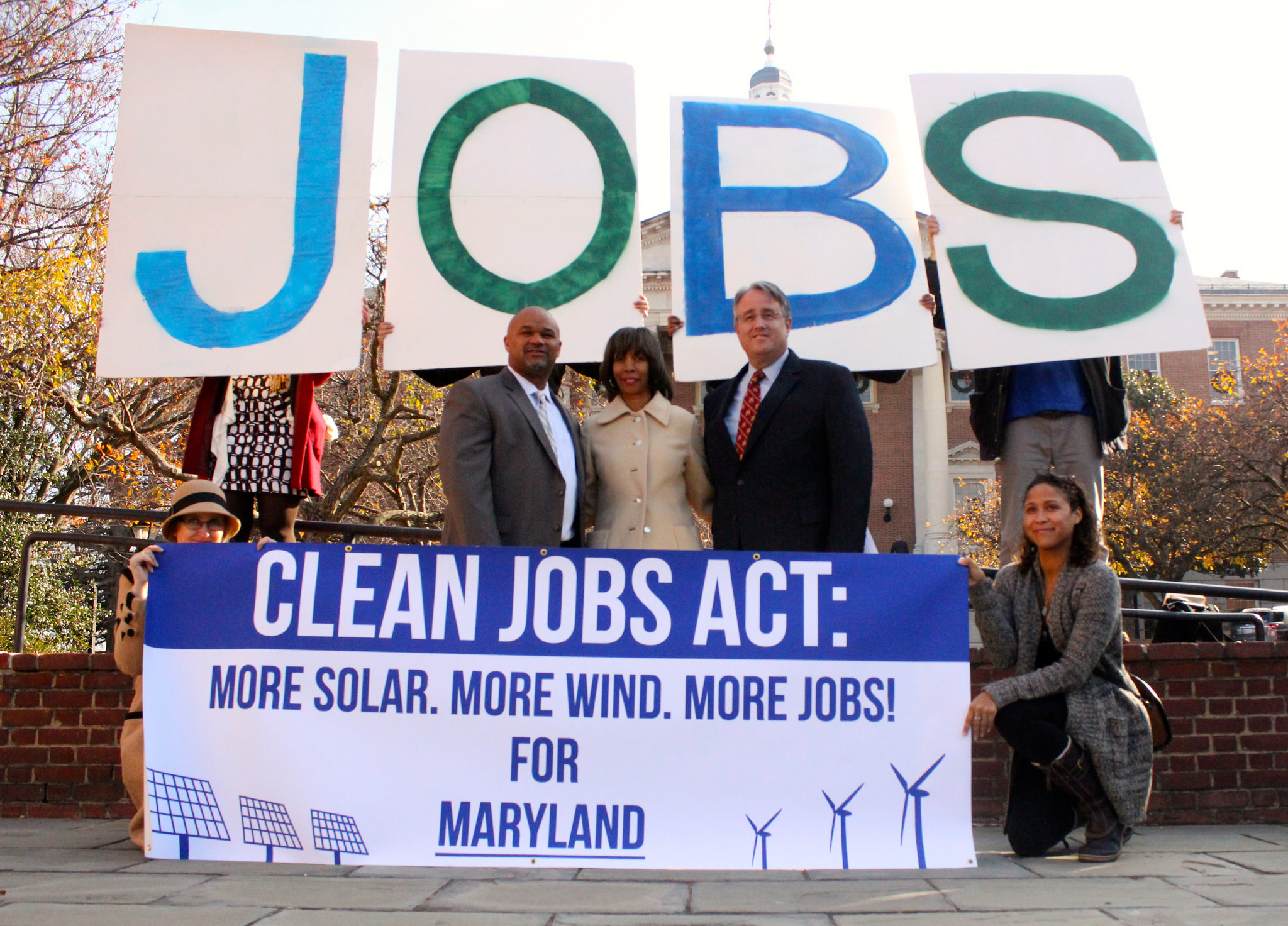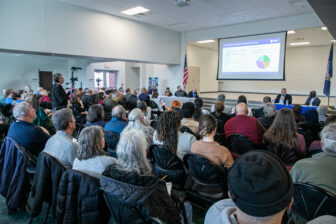2016 bill will expand wind and solar while creating good-paying jobs and a diverse clean energy workforce
ANNAPOLIS—As world leaders meet in Paris to marshal global climate action, top Maryland lawmakers came together in Annapolis today to unveil their plan to create the largest dedicated clean energy jobs and business development program in state history.
As part of 2016 legislation to significantly expand Maryland’s use of renewable electricity, Senate Majority Leader Catherine Pugh (D-Baltimore) and Delegate Dereck Davis (D-Prince George’s) are proposing a $40 million plan to train and prepare more Marylanders for careers in clean energy and to bolster minority- and women-owned businesses within the clean energy economy.
The lawmakers announced the plan, called the 2016 “Clean Jobs Act,” during a press conference on Lawyers’ Mall alongside Senator Rich Madaleno, Maryland small business, community college, and job training leaders, and climate advocates.
“Maryland needs to increase our renewable energy standard to 25 percent while putting in place funding to increase the diversity of business owners and workers,” said Sen. Pugh, who sits on the Senate Finance Committee. “The Clean Jobs Act will give more Marylanders the opportunity to thrive in the growing clean technology sector and put cities like Baltimore on the forefront of clean energy development.”
“2016 is the year to pass this ‘Clean Jobs Act’ for Maryland,” said Del. Davis, chair of the House Economic Matters Committee. “This bill will sustain an estimated 2,000 additional clean energy jobs right here in Maryland. The average Maryland solar installer earns nearly $23 per hour. Greater workforce development investments can direct those jobs where they’re needed most, while unlocking the full talent of our state’s clean energy entrepreneurs.”
Senator Brian Feldman and Delegate Bill Frick of Montgomery County are lead sponsors of the legislation to expand Maryland’s Renewable Portfolio Standard (RPS). Sen. Pugh and Del. Davis will join Senator Mac Middleton, chair of the Finance Committee, and Senator Rich Madaleno, vice-chair of the Budget and Taxation Committee, as co-sponsors of the bill in 2016.
“I’m proud to sponsor this legislation because addressing climate change and improving our economy go hand in hand,” said Sen. Brian Feldman. “It’s time to lock in Maryland as a leader in both.”
The legislation would ensure that Maryland gets 25 percent of its electricity from clean sources like wind and solar power by 2020, up from the state’s current goal of 20 percent by 2022. By creating incentives for roughly 1,300 megawatts of new clean energy, the bill would significantly improve Marylanders’ air quality and reduce greenhouse gas emissions, which are causing rising sea levels, record storms, and increased flooding.
“Maryland’s solar industry now employs over 3,000 workers, and the industry expects to grow 26 percent this year, adding 750 more jobs,” said Del. Frick. “In 2016, it’s time to speed up this growth while providing better training to more Maryland workers.”
“Climate change solutions—like cleaner, more efficient energy—mean healthy air and healthy people who can go to work and support their families,” said Sen. Madaleno. “All Marylanders deserve clean air to live healthier and more meaningful lives.”
Maryland has met its existing renewable energy standard every year since the RPS program was first implemented in 2005. Maryland now ranks among the top solar states in the nation. Plummeting solar and wind prices and abundant, untapped renewable assets — from sunny rooftops to blustery Eastern Shore farmland — position the state to easily achieve a higher goal. Collectively, Maryland’s policies to address climate change are expected to create 26,000 to 33,000 new jobs and grow wages by tens of billions of dollars by 2020, according to state data.
The new workforce development plan within the RPS bill would tap $40 million of unallocated contributions to Maryland’s Strategic Energy Investment Fund. Part of the funding would provide pre-apprenticeship job training in the clean energy sector targeted to areas of the state with high unemployment. Bolstering existing job training programs at Maryland community colleges is one example of how the funds could be put to work.
Gregory Mason, Vice President of Business and Continuing Education at Baltimore City Community College, also spoke at today’s press conference: “Not only is more renewable energy critical to preserving our natural resources, but it also offers a foot in the door for our students to begin and advance careers within a well-paid, burgeoning industry.”
Additional funding would establish a Clean Energy Business Development Fund to help minority- and women-owned businesses enter and grow within the clean energy economy in Maryland.
“We started our business in Maryland in part because of its commitment to expanding clean energy technologies,” said Daniel Wallace, director of Technical Sales for BITHENERGY. “The Clean Jobs Act will significantly enhance the economic imperatives that are necessary for clean energy companies like ours to thrive and to create jobs.”
Today’s announcement adds to growing momentum for climate action in Maryland. Over the past year, legislation to expand Maryland’s RPS law gained support from a broad base of faith, labor, health, social justice, and environmental constituencies — including the NAACP, Maryland Working Families, SEIU, seven Maryland bishops and top ecumenical leaders. Meanwhile, in late October, the state’s bipartisan Climate Change Commission voted unanimously in support of extending and strengthening Maryland’s statutory goal for reducing greenhouse gas emissions.
“While world leaders gather in Paris at the biggest global climate summit of this decade, Maryland leaders are stepping up to put concrete solutions into motion,” said Mike Tidwell, director of the Chesapeake Climate Action Network and member of the Maryland Climate Coalition. “Our clean electricity standard is our state’s top program for reducing climate pollution. By increasing it, we can build a more just and sustainable economy while doing our part to reduce greenhouse gas emissions.”
A memo on the proposed $40 million workforce development plan is available at: http://chesapeakeclimate.org/wp-content/uploads/2015/12/Maryland-Clean-Jobs-Plan-Workforce-and-MBE-Memo.pdf
A fact sheet on the benefits of expanding Maryland’s renewable energy standard is available at: http://chesapeakeclimate.org/wp-content/uploads/2015/12/MCC_Forward-with-Clean-Energy_25percent_120715.pdf
Photos from today’s press conference are available for use at: https://www.flickr.com/photos/chesapeakeclimate/albums/72157661471776619
###
Contact:
Kelly Trout, 240-396-2022 (office), kelly@chesapeakeclimate.org
James McGarry, 914-563-2256 (cell), james@chesapeakeclimate.org






